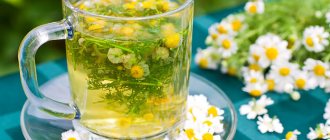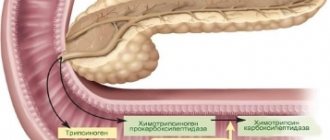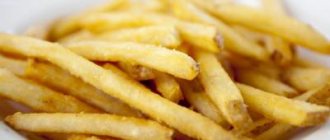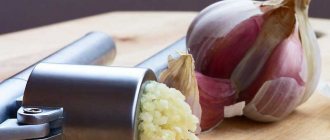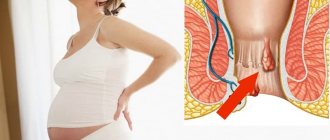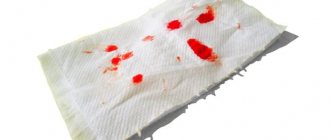What causes bleeding from hemorrhoids?
Hemorrhoids occur when the flow of blood in the veins of the rectum is disrupted. They swell from its excess and increase in size. Internal hemorrhoidal cones appear, which grow, block the rectum, and impede the passage of feces. If you push too hard during a bowel movement, the nodes will bleed even more.
Five reasons for bleeding from the anus:
- Constipation . Emptying the intestines is difficult, the stool becomes hard, and constantly injures the hemorrhoidal cones. They don’t have time to heal, and every time you go to the toilet they get damaged and become more inflamed. Bleeding gets worse over time.
- Diarrhea. It also causes inflammation, causing thinning of the mucous membranes.
- Stagnation of blood . Impaired blood flow worsens the condition of the vascular walls, leading to cracks, erosions and ulcers during the movement of feces.
- Straining . You should not sit on the toilet for a long time or push hard, even if you are constipated.
- Advanced stage of hemorrhoids . Too large bumps fall out, become inflamed, and bleed more and more if appropriate treatment has not been carried out.
Secondary causes of blood stagnation and bleeding:
- hereditary factors;
- during pregnancy;
- sedentary lifestyle;
- overweight, obesity;
- hard physical work;
- lifting load;
- liver pathologies, including cirrhosis.
Hemorrhoids with blood means that the disease has begun to progress and, in the absence of proper treatment, will cause complicated pathologies in the future, characterized by increased temperature, swelling, and increased inflammatory processes.
During this period it is not recommended:
- drink alcoholic beverages, even beer:
- to drink coffee;
- supercool;
- lift weights;
- sit on the toilet for a long time and push.
Features of treatment of the disease
The stage of the disease influences therapy . If the bleeding is minor and is observed only during bowel movements, then conservative treatment is used.
Pharmacy drugs
Immediately use local preparations such as suppositories and various ointments.
They successfully soften stool and activate the rectum.
This will help avoid injury to the hemorrhoids.
In addition, they reduce pain during bowel movements.
Popular drugs are:
- To stop the bleeding, tablets or intramuscular injections are used: “Dicynon”, “Vikasol”. Often a hemostatic sponge is applied to the nodes.
- To speed up the healing of affected nodes, use: Aurobin ointment, Proctosan. Troxevasin ointment or Hepatrombin will help relieve inflammation.
- Venotonics are used to strengthen the walls of veins. They eliminate blood stagnation in the veins and increase their tone. The following tablets have proven themselves to be effective: Phlebodia 600 and Detralex.
If a positive result cannot be achieved, then other methods are used.
You will learn how to get rid of hemorrhoids using pharmaceutical products here:
Minimally invasive procedures
Now there are quite a few successful methods that can quickly eliminate the disease. But before starting treatment, the patient must undergo certain examinations in order to select an adequate treatment strategy.
Minimally invasive methods are recommended for these symptoms:
- strong burning sensation.
- During defecation, bloody discharge is observed.
- Painful sensations in the anal area.
- Hemorrhoids began to fall out.
- Strange heaviness in the anus area.
All these signs are typical for hemorrhoids, and minimally invasive intervention will help eliminate them. These are non-surgical measures, but are not inferior in effectiveness to other treatment methods.
The most common procedures are:
- cryodestruction . The nodes are destroyed by liquid nitrogen. The method avoids classical surgery.
- Sclerosative therapy . It is usually used in the first stage of the disease, but the method is also effective in cases of heavy bleeding.
- Photocoagulation . Used for prolonged bleeding. The procedure is absolutely painless and does not threaten complications.
- Radiosurgery . Exposure to high frequency radio waves.
- Ligation . Shown if nodes are dropped. No long recovery will be required.
The most popular method is ligation with latex rings. The method is suitable for all people suffering from hemorrhoids. Our next video is about this:
Surgical intervention
In extreme cases, the question of surgery is raised. Radical treatment is used if the disease is advanced.
How does this happen:
- hemorrhoidectomy . A clamp is applied to the hemorrhoidal node and the plexus is cut off. This operation eliminates hemorrhoids completely, and the likelihood of relapse is minimal. But there is a disadvantage, which is long-term rehabilitation.
- Operation Longo .
The nodes are not manipulated, but part of the intestine is excised. The advantage of the operation is painlessness and a quick recovery period. In addition, it allows you to remove many internal nodes. - For node thrombosis, thrombectomy . During the operation, the clot is removed from the blocked vessel, and blood flow is restored. But it should be taken into account that this does not relieve hemorrhoids, but only normalizes blood circulation and relieves pain.
But there is no need to rush into surgery. First you need to carry out a course of therapeutic procedures.
Folk remedies
It is quite acceptable to use traditional medicine recipes. Infusions and decoctions of medicinal plants are widely used:
- Tincture of calendula. Used in microenemas. You can also wash the anus.
- Blueberry decoction. Stops bleeding.
- Chamomile. Enemas and lotions of external nodes are made with the infusion.
- Yarrow. The decoction relieves inflammation and stops bleeding. You can do cold lotions.
But we should not forget that even effective folk methods are used as a complement to drug treatment. You should definitely consult your doctor.
Next, we bring to your attention a video about the treatment of hemorrhoids with folk remedies:
To prevent such an unpleasant disease, it is recommended to follow simple rules :
- no need to sit on the toilet for a long time.
- Straining is not required for normal bowel movements.
- It is advisable to replace toilet paper with flushing.
- A strict diet is not needed, but it is better to avoid spicy, smoked and alcoholic foods.
- Limit heavy lifting.
- Exercise should not be ignored.
But if unfavorable symptoms have already appeared, then it is necessary to start treatment and follow all the doctor’s recommendations.
Symptoms
Bleeding from the anus is not always accompanied only by hemorrhoids, but can also occur for other reasons.
It is important to know eight distinctive features of this phenomenon:
- Lifting heavy objects, backbreaking physical work . Blood pressure in the veins increases, hemorrhoids bleed.
- Dark blood . It is released first at the time of bowel movement. After the stool is released, a thin stream of scarlet blood begins to pulsate.
- Stops on its own . It usually does not require urgent medical attention and goes away within a short period of time.
- Does not occur in a calm state. Often accompanies bowel movements or physical work.
- Not accompanied by other discharge . Usually this is pure scarlet blood without purulent or mucous inclusions.
- Not present in feces . Stands out on its own and can be seen on toilet paper, toilet rims or underwear.
- It always comes up unexpectedly . You suddenly see traces of scarlet blood on a napkin and do not yet understand what happened.
- There are no unpleasant or painful sensations.
An advanced form of hemorrhoids causes serious pathologies that cause bleeding. Often there are streaks of mucus or pus present directly in the stool.
The color of the stool in this case can range from brown to greenish-yellow.
Pathologies accompanied by bleeding from the anus:
- Crohn's disease;
- diseases of the colon and sigmoid colon;
- weakening or injury to the sphincter muscles;
- anal fissures in acute or chronic form;
- proctitis, accompanied by the formation of ulcers and erosions;
- intestinal tumors of a malignant or benign nature;
- injury to the intestinal mucosa, including during medical procedures;
- presence of a foreign body;
- bleeding polyps.
You cannot associate blood discharge from the perineum only with hemorrhoids. It is necessary to undergo diagnostics and establish the cause of this phenomenon. .
What to do if external hemorrhoids bleed?
This question is definitely worth thinking about if the disease exists.
Carefully! Any bleeding is a risk of blood poisoning.
If hemorrhoids bleed, then there is an open wound into which infection can easily enter. Especially in a place like the intestines.
Therefore, the presence of bleeding with external hemorrhoids is a direct indication for examination by a proctologist. Standard doctor's indications in this situation:
- Diet. All foods that lead to constipation and hardening of stool are excluded. This is done so as not to worsen the situation.
- Treatment with drugs. To stop bleeding and prevent infection, ointments and suppositories are suitable for treating hemorrhoids. For example, Relief, Troxevasin, Proctosan, or Heparin ointment.
- Auxiliary procedures. Washing with an infusion of oak bark, a bath with chamomile, wheatgrass, yarrow and tannin successfully stops minor bleeding.
Heavy bleeding
If the bleeding does not stop, or there is heavy discharge, you should call an ambulance. In this condition, treatment can only be carried out in a hospital setting.
Actions of doctors:
- stop bleeding. Special systemic drugs are used, for example, Vikasol. The process is stopped locally with suppositories with adrenaline and collagen sponges.
- Replenishment of lost blood. The analysis determines the degree of “bloodlessness”; if the losses are serious, a transfusion is given.
Possible complications
Regardless of how much blood and how often a hemorrhoid is released, it needs to be treated.
Why are bleeding hemorrhoids dangerous?
- Anemia . In severe hemorrhoids, blood loss can reach 200 ml with each bowel movement. Hemoglobin drops so much that the body can no longer make up for its deficiency. Iron deficiency anemia develops, causing pallor, pressure, and general malaise. A decrease in protective forces is fraught with exacerbation of old chronic diseases and the occurrence of infectious inflammatory processes.
- Thrombosis of hemorrhoidal cones associated with enormous blood loss and tissue death. The condition threatens the death of the patient and requires immediate surgical intervention.
- Acute paraproctitis . Against the background of constant inflammation, anal fissures, purulent discharge, and fistulas occur. Urgent hospitalization and, most likely, surgical intervention are needed.
- Ulcerative colitis, the formation of polyps, the development of cancerous tumors . These pathologies are a consequence of heavy bleeding, or can themselves cause it from the rectum.
At an advanced stage, it is quite difficult to stop bleeding. This can only be done by a specialist in a hospital setting.
If you care about your health and do not want to end up on the list of patients with a fatal outcome, seek advice in a timely manner.
Symptoms of external hemorrhoids
It is clear that in the advanced stage everything is visible to the naked eye.
At the initial stage of the disease, you may notice the following symptoms of external hemorrhoids:
- itching of the anus, and other unpleasant sensations;
- pain during bowel movements;
- bloody traces after the process of defecation (this happens if there are cracks), as well as watery discharge of a different nature;
- swelling of the anal area;
- When palpated, you can feel soft lumps.
First aid: how to help yourself before visiting the doctor
How to stop bleeding from hemorrhoids at home, what to do if it bursts? You can find yourself in such a situation without even expecting it. Therefore, it is necessary to know what to do in the current circumstances.
Cold
Cold is your main assistant for stopping bleeding, acting as an ambulance at home. Efficiency is associated with the ability to instantly reduce the permeability of vascular walls and narrow capillaries. If pain occurs, which rarely happens with hemorrhoids with blood, the cold blocks the sensitivity of the nerve receptors.
3 Ways to Use Cold for Hemorrhoidal Bleeding
- Ice compress . Helps well with external knots. Roll the bandage into 4-5 layers, soak in ice water, and apply to the perineum. You can take ready-made ice cubes from the freezer. It is good to have frozen herbal infusions of chamomile or oak bark. They will relieve inflammation and dry. Compresses and lotions are made while lying on your side. Action time: 3-5 minutes.
- Ice candles . Intended for use in the case of internal hemorrhoids. Pour herbal infusions or water into prepared cone-shaped forms made of thick paper, made yourself, and put them in the refrigerator until completely hardened. Before use, remove the paper, dip the candle in warm water and carefully insert it into the perineum for five seconds, no more. In the future, the time can be increased.
- Device “Krinus” . It is advisable to have at home if you suffer from hemorrhoids. It will replace cold compresses and ice suppositories; it works comfortably, excluding the effects of low temperatures on internal organs and skin.
Be careful.
Cold is contraindicated for those who suffer from pathologies of the bladder, kidneys and pancreas; it can provoke inflammatory processes. In this case, it is worth choosing another method of stopping the blood.
Hemostatic drugs
Used as emergency measures:
- Vikasol;
- Etamsylate;
- Dicynone.
Available in tablets and ampoules. If the bleeding is not too severe, it is better to stop on tablets.
Attention!
Under no circumstances should it be used for a long time without consulting a doctor. They have serious contraindications, side effects and administration features.
Hemostatic sponge
Sold in any pharmacy. The porous material of the sponge consists of collagen fibers impregnated with furatsilin and boric acid. Thickness from six to nine millimeters.
For hemorrhoidal cones, apply to the perineal area for 1-2 minutes. It becomes saturated with blood, enlarges, compresses the blood vessels and the blood stops. It has a healing and antiseptic effect, relieves inflammation.
If the nodes are internal, it is inserted into the rectal area, but very carefully. Subsequently, it dissolves there on its own, leaving no traces.
The listed measures should be used in emergency cases when bleeding began unexpectedly and lasted more than half an hour.
After this, professional help is required, a thorough diagnosis, identifying the cause and making a diagnosis.
Find out which doctor to contact if you suspect hemorrhoids >>>
Only a proctologist can advise how and with what to treat hemorrhoids in the future.
At the first appointment, the doctor performs an external examination and a digital rectal examination.
If necessary, prescribe instrumental diagnostic methods using an anoscope, sigmoidoscope, colonoscope. Based on the medical history and research results, he makes a diagnosis and prescribes treatment, including preventing blood loss in the future.
Effective medications for the first and second stages of hemorrhoids
Conservative treatment is represented by rectal suppositories, ointments, gels that can have an analgesic effect, increase muscle tone, dilute stool, and prevent injury to hemorrhoidal cones.
What effective suppositories for hemorrhoids with blood should be used first:
- with propolis;
- with adrenaline;
- with tannin;
- with sea buckthorn oil;
- with calendula;
- Relief-Ultra;
- Methyluracil;
- Hepatrombin.
Rectal suppositories are used mainly for internal hemorrhoids. They promote rapid healing, stop inflammation, and dry out. Usually applied twice a day.
It should be administered with extreme caution so as not to further injure the inflamed areas or cause re-bleeding.
Effective and cheap ointments are presented:
- Vishnevsky ointment;
- Proctosan;
- Troxevasin;
- Relief;
- Hepatrombin;
- Methyluracil.
Creams for hemorrhoidal bleeding:
- Proctonis;
- Boro Derm;
- Fitol-5;
- Prostoglivenol;
- Mastocrel gel.
To strengthen the vascular walls and eliminate stagnant processes, the doctor may prescribe the drug Detralex in tablets for oral administration for several months.
Microclysters
Promote regeneration and restoration of damaged tissues, their healing, reduce the risk of recurrent hemorrhoids with blood. Used in the formation of internal cones.
Enema contents: three most effective options:
- With hydrogen peroxide . Dissolve one teaspoon of the product in a glass of warm water. For one procedure, 50 ml of solution is enough. It is recommended to apply three times a day. This is especially true if blood loss is accompanied by painful and unpleasant sensations.
- With herbal infusions . Chamomile, calendula, blueberry, and yarrow flowers are suitable as medicinal raw materials. Relieve inflammation, heal, regenerate damaged tissues, have a bactericidal and astringent effect. Can be replaced with lotions and compresses when external nodes appear.
- With tannin . Substance concentration 1%. Mainly used for pain and itching. Creates an invisible protective film on the surface of the rectal vessels, reducing the pain threshold.
During conservative treatment, it is important to monitor personal hygiene, wash after each bowel movement, use antiseptics, solutions of medicinal herbs with tannins.
General therapy for hemorrhoids with blood involves, along with drug treatment, the use of physiotherapy, folk recipes, special nutrition and preventive measures.
Surgery
Recommended for frequent and severe hemorrhoidal bleeding, risk of anemia, lack of positive dynamics of conservative treatment.
Urgent surgery to excise hemorrhoidal cones is carried out mainly at the last, fourth stage of the disease.
In other cases, minimally invasive methods are used, presented by:
- sclerotherapy;
- ligation with latex rings;
- cryodestruction, freezing at low temperatures;
- laser removal.
After surgery, medications are prescribed:
- Detralex, Phlebodia, Troxevasin - to restore venous tone;
- iron-containing - to restore hemoglobin;
- improving the composition and properties of blood.
Treatment of hemorrhoids with bleeding
An effective way to combat hemorrhoids is the use of rectal suppositories or ointments. A specialist will be able to choose the right hemostatic drugs for hemorrhoids after examining the patient. He will make a diagnosis and assess the extent of the disease. More often, suppositories or ointment Relief Advance are prescribed. The drug gives a lasting effect even in severe forms of the disease. In most cases, a week's therapy is sufficient. You can insert candles 4 times a day.
Gepatrombin G suppositories help stop bleeding and normalize the patient’s condition. They have proven their effectiveness in treating hemorrhoids with blood. After just a few uses, relief comes because the components of the drug stop inflammation, promote tissue regeneration, heal cracks, and promote rapid blood clotting. The pine and lemon oils included in the drug relieve burning, itching and pain. Suppositories should be administered 2 times a day after bowel movements.
Hemostatic drugs
An effective treatment for bleeding hemorrhoids is the use of a beekeeping product such as propolis. It has a good effect on blood clotting, so it is included in suppositories and is relevant in cases where hemorrhoids bleed heavily. Suppositories with propolis are recommended to be inserted into the anus every day before bed. The course of treatment is a week. Suppositories have the following properties:
- anti-inflammatory;
- wound healing;
- hepatoprotective.
If hemorrhoids bleed, tablet medications are prescribed, for example, the medicine Dicynon, Tranex or Etamzilat. They have the following properties:
- improving vascular permeability;
- activation of thromboplastin formation;
- improving blood clotting.
Fleming's ointment is often prescribed for illnesses accompanied by bloody discharge. It has the following effect:
- relieves inflammation;
- relieves pain;
- kills bacteria;
- dries;
- eliminates venous congestion.
- Vegetable soup: recipes with photos
- DIY flowers made from satin ribbons
- How to glue vinyl wallpaper on paper
Ointments for hemorrhoids with blood to reduce inflammation and heal nodes
If hemorrhoids bleed heavily, Vishnevsky ointment can be used in the form of compresses. It removes the symptoms of the disease: reduces inflammation, reduces pain, heals microcracks. The drug is also recommended for women during pregnancy. Heparin ointment is no less effective, preventing thrombosis and improving blood flow. The drug Proctosan will relieve pain especially quickly.
Tablets to strengthen the walls of blood vessels
Different degrees of disease development are treated with different types of tablets. The proctologist should prescribe medications after a general examination. Detralex tablets are considered one of the most effective phlebotropic drugs. They are relevant for acute or chronic forms of the disease and when hemorrhoids bleed heavily. In the first case, you need to take the drug according to the following scheme: 4 days, 3 tablets 2 times a day, and then 3 days, 2 tablets 2 times a day. In the second case, it is recommended to take 1 tablet 2 times a day with meals. The duration of therapy is calculated by the doctor. The drug provides:
- regulation of venous outflow;
- improves the condition of capillaries;
- protects and strengthens the walls of blood vessels;
- tones the veins.
If hemorrhoids bleed heavily, Troxevasin tablets may be prescribed. They are taken with meals, 1 tablet for up to 10 days, and provide:
- strengthening the walls of blood vessels;
- improvement of vein tone;
- powerful antioxidant effect on vascular cells.
Traditional methods
Compresses, lotions and baths prepared with medicinal plants and herbs will help you get rid of rectal bleeding at home at the initial stage of the disease.
Nine best medicinal plants that will quickly stop bleeding from hemorrhoids:
- Aloe juice . Apply freshly squeezed plant juice to the affected areas of the perineum several times a day.
- Pharmaceutical camomile . Buy dried flowers at the pharmacy, brew a tablespoon with a glass of boiling water, leave, strain. For internal nodes, administer microenemas in the morning, afternoon and evening. For external use, it is better to make lotions, changing tampons several times a day.
- Calendula . Two tablespoons per glass of boiling water, leave in a thermos, strain. Use for daily hygiene procedures and enemas.
- Blueberries . One of the most effective ways. Take two tablespoons of raw material per glass of water, keep it in a water bath for half an hour, filter, add plain water to the original volume. Used for enemas, 50 ml of decoction is used at a time.
- Yarrow . A decoction of it stops bleeding and has an anti-inflammatory and antibacterial effect. Add a tablespoon of dry raw material to a glass of hot water and keep on low heat for 15 minutes. Cool, filter, add warm water to the original volume. Use as microenemas or cold lotions on external nodes.
- Oak bark . A decoction of it with the addition of other herbs heals wounds, relieves inflammation, and has a drying effect. Mix four teaspoons of bark, two teaspoons each of valerian root and horsetail, add 500 ml of water. Keep on low heat or water bath for half an hour. Leave for at least six hours. Filter. Use for enemas, lotions, compresses and washing the perineum after defecation.
- Garlic . Steam baths are effective. Place a hot brick at the bottom of a metal bucket and a few cloves of garlic on it. Sit on top, wrap yourself up and sit until it cools down. Beware of burns. Do several procedures per day. The blood stops quite quickly.
- Sea buckthorn oil . Use for microenemas or compresses.
- Horse chestnut . A decoction of it will stop bleeding, relieve pain and inflammation. Use as a lotion or take orally.
There are a lot of traditional methods of treating hemorrhoids with herbs. The above are only those that will quickly help with hemorrhoids with blood, burst nodes or minor blood loss.
It is important to know
that it is better not to use hot water. It should be warm, cool or room temperature.
How to stop bleeding at home
The appearance of blood after bowel movements is a dangerous symptom that requires prompt medical attention.
Before visiting a proctologist, take a number of independent measures that will help stop bleeding:
- Staying calm. Under stress, blood pressure rises, which leads to increased blood loss.
- Careful hygiene. Through a damaged vessel, infections enter the body faster. Wash with cool water and mild neutral soap. For wiping, use wipes with aloe, chamomile or witch hazel. These ingredients have soothing, antihemorrhoidal properties.
- Applying cold compresses. Ice is wrapped in gauze and applied for 10 minutes. Under the influence of cold, blood vessels narrow, bleeding and swelling decrease.
- The use of hemostatic agents is indicated for severe bleeding. The drugs stop bleeding, reduce inflammation, and have a reparative effect.
The listed actions must be carried out solely to stop bleeding. The measures will not help cure hemorrhoids. Delaying seeking medical help can lead to serious complications.
How to stop bleeding from hemorrhoids: do-it-yourself suppositories and ointments
Rectal suppositories always work instantly due to the rapid absorption of medicinal components.
DIY propolis honey candles
Simple and effective:
- Honey - candles are formed from the candied bee product and frozen. You can add butter or aloe juice.
- From propolis - how to make such suppositories is described in detail in our article.
- From raw potatoes , cut a block in the shape of a candle and carefully insert it into the anus, after dipping it in any vegetable oil.
- From plantain and animal fat. Mix ten tablespoons of fat and two identical tablespoons of fresh crushed leaves of the plant. Form and freeze suppositories or use as an ointment.
What are bleeding hemorrhoids?
Bleeding hemorrhoids are a very loud bell , informing a person about the seriousness of the disease and pushing him to visit a specialist. However, bleeding does not always mean the occurrence of complications.
Minor bleeding is also typical for the initial stage of the disease.
This is due to the fact that with constipation, hard feces injure the rectal mucosa, causing cracks and wounds in the anus. You can get rid of this problem by starting to follow a proper diet and restoring normal bowel movements. The danger arises when bleeding becomes chronic. In this situation, even in the absence of pain, immediate contact with a specialist and further treatment are required.
The presence of this symptom can lead to the development of more serious complications, such as anal fissures, rectal fistula, acute paraprocatitis, and in special cases even colon cancer.
Hemorrhoidal bleeding during pregnancy
You can quickly stop bleeding from the anus due to hemorrhoids during pregnancy. But it is necessary to take into account the specifics of the situation.
Candles that contain belladonna or belladonna should not be used. And in folk recipes, do not use senna and buckthorn herbs.
Of the ointments during pregnancy for internal hemorrhoids, the following are most often prescribed:
- Aurobin;
- Relief;
- Hepatrombin;
- Vishnevsky or Fleming.
Herbal or hydrogen peroxide enemas can help get rid of external lumps.
Cold - ice or just cold compresses - will help stop the bleeding quickly.
After the bleeding has stopped, the next steps should be coordinated strictly with the gynecologist.
What measures should be taken if blood is detected from the anus?
First, schedule an appointment with a proctologist in the near future. He will be able to diagnose the stage of the disease and prescribe the correct treatment. With minor bleeding, external hemorrhoids are treated with medications - using anti-inflammatory ointments and tablets.
If you cannot urgently visit a doctor, you should do the following:
- Reduce pain with cold baths or applying ice;
- The wound is disinfected with hydrogen peroxide. Do not use alcohol, which will cause severe pain;
- Don't endure pain. A tablet of analgin, ibuprofen or their analogues will come in handy;
- Lubricate the wound with disinfecting and healing ointments. For example, Vishnevsky ointment, Levomekol, etc.
If the bleeding has been stopped, warm baths have a wound-healing effect. When combined with anti-inflammatory herbs such as chamomile and sage, they are quite effective. You can use compresses and enemas with these herbs.
Vasoconstrictor herbs and alcohol-free medications are also useful.
And from the moment bleeding appears, the patient must adhere to a strict diet. The diet should be based on foods high in fiber, as well as vitamins obtained from fresh vegetables and fruits. It is also necessary to reconsider your lifestyle: balanced physical activity, giving up bad habits and anal sex.
Participate in an anonymous survey:
Which symptom of hemorrhoids bothers you most?
Separately, it should be said what to do if external hemorrhoids bleed in pregnant women. The drugs chosen are only those that will not harm the fetus. And here folk remedies play a special place. Tampons with potato juice, baths with herbal decoction or lotions have a hemostatic and antiseptic effect. Medicines include pain-relieving suppositories and ointments.
And if external hemorrhoids bleed, you should visit a doctor as soon as possible.
Nutritional features: diet for hemorrhoids with blood
At the first signs of bleeding hemorrhoids, you should adhere to certain dietary rules and temporarily go on a diet to help thin the stool. The nodes will not be so injured and will heal faster.
On the first day, it is advisable to consume only liquids or broths.
Avoid foods that cause vasodilation, increased blood flow to the pelvic organs, fermentation, flatulence, gas formation:
- alcohol-containing drinks, coffee, kvass, strong chas;
- spices, marinades;
- smoked products;
- sauces and seasonings;
- baked goods, desserts and sweet fruits;
- vegetables with plant fibers - cabbage, radishes and radishes, corn;
- pasta;
- rice;
- potato.
The daily menu includes four dishes.
- From fish and lean meat.
- Broths made from them.
- Bran bread.
- Cereals.
Added to them:
- vegetable and fruit dishes;
- dried fruits;
- fermented milk products.
From drinks:
- plain water, mineral still;
- natural juices;
- decoctions of medicinal herbs;
- green tea;
- compotes.
Basic diet rules
- Fractional meals . In small portions, 5-6 doses per day with an interval of 3 hours. Avoid overeating.
- Drinking fluids . Two liters of any drinks and water per day will help avoid constipation and hardening of stool.
- Vegetable oil . You should take two teaspoons several times a day.
- Kefir for the night . Or a glass of any fermented milk product.
Such a dietary restriction will help restore the functioning of the stomach and intestines, normalize nutritional processes, eliminate constipation and permanent injuries to hemorrhoids.
How to treat Traditional medicine
Treatment of internal bleeding hemorrhoids, as well as its external form, should begin with a trip to the doctor.
Nobody bothers you to use folk remedies. The purpose of a visit to the doctor is to make sure that the bleeding is due to hemorrhoids and to understand the stage of the disease.
If hemorrhoids bleed heavily and the intestine prolapses, then in this case you will have to rely only on surgical intervention.
Medications for bleeding hemorrhoids:
- Candles. This is the most famous remedy for bleeding hemorrhoids. Usually they are taken 2 times a day - after bowel movements and before bedtime. If for some reason there is no stool, then you can put candles once a day. They effectively relieve pain and stop bleeding.
- Hemostatic agents. They allow you to defeat even chronic bleeding hemorrhoids. The most common drugs are a 10% solution of calcium chloride (take 1 tablespoon 4 times a day), carboxylic acid (usually a solution in almond oil), solutions of novocaine (in peach or almond oil, sometimes they are also mixed with menthol).
- Antibiotics. Your doctor may prescribe treatment with oral tablets, which can also help stop bleeding hemorrhoids. Most often this is Detralex.
- Creams and ointments. Ointment for bleeding hemorrhoids will also not hurt, but it is important to consult a doctor so that an unsuccessfully chosen remedy does not damage the mucous membrane even more. In particular, heparin ointment will be useful.
Why do hemorrhoids bleed?
In men and women, the causes of blood discharge from the anus are the same. The main one is mechanical damage to hemorrhoids during defecation. As the disease progresses, the walls of the blood vessels become thinner and become painful. If a person eats spicy, smoked, fatty foods, then chronic constipation occurs. When moving through the rectum, hard feces damage the walls of blood vessels, causing bleeding. There is a short period of time between visits to the toilet, so the wounds do not have time to heal and are injured again. The more inflamed the nodes are, the more blood flows.
Scarlet blood
If rectal bleeding is scarlet in color, then this indicates a violation of the integrity of the colon or rectum, hemorrhoids, or anal fissure. Blood comes out in small portions after stool. Defecation is accompanied by pain and burning sensations, which persist for some time after defecation. Bloody discharge is sporadic, blood loss is insignificant.
Dark blood
If cherry-colored blood is released from the anus, this indicates one of the pathologies of the colon (ulcerative colitis, Hirschsprung's disease, and others). Rectal bleeding of a dark red color indicates the presence of polyps or the development of cancer. Black discharge from the anus indicates a pathology of the stomach.
Blood clots
If blood is released from the anal passage in the form of clots, this may be a manifestation of a malignant tumor located in the distal parts of the colon. The cause of abundant clots may be the presence of a disease such as intestinal diverticulosis. The disease is not oncology. Diverticulosis can develop in the colon or sigmoid colon.
What to do when the first signs of illness appear?
First of all, don't let panic overwhelm you!
Bloody discharge in the first stage of the disease is not life-threatening. Basically, blood is released only during bowel movements and stopping it is not difficult.
You can provide first aid to yourself: after emptying, rinse the anus and give yourself a cold lotion. The cold will help constrict the blood vessels and stop the bleeding. In an emergency, it is recommended to take one of the hemostatic drugs.
There is no point in further self-medication, so your next action should be to make an appointment with a proctologist. The specialist will prescribe you the necessary treatment that will help you completely get rid of all unpleasant symptoms.
Medications
In order to stop bleeding, special anti-inflammatory drugs are usually prescribed that increase blood clotting, promote rapid regeneration of damaged tissue and reduce pain:
- The main medicine is hemostatic anal suppositories (Ultraproct, Gepatrombin G, Natalsid, Relief, etc.); they provide the fastest and most effective action.
- Along with suppositories, oral hemostatic drugs may be recommended, such as: Dicynon, Vikasol, Etamzilat, as well as other drugs to improve the condition of blood vessels and restore iron in the body.
Attention! Before using any drug, consult a doctor.
Folk remedies
In addition to the basic methods of treating bleeding hemorrhoids, folk remedies will not be superfluous.
- Enemas and baths from a decoction of calendula, chamomile, yarrow herb, as well as a 3% solution of hydrogen peroxide.
- Hot baths with garlic, onion peels, mumiyo.
- Cold candles made from frozen decoctions of various medicinal herbs (St. John's wort, calendula, etc.)
- Ice compresses.
- Compresses made from sea buckthorn oil or raw potato juice.
- Ingestion of medicinal herbs (raspberries, birch bark, celandine, etc.).
Despite the fact that traditional recipes are based on herbs, are safe and do not give side effects, it is still necessary to consult a doctor in advance and only after his approval begin traditional treatment.
Operations
Surgical intervention is used only in the last stages of the disease with chronic blood loss, which provokes the development of anemia.
In case of continuous blood loss, an urgent operation is required - hemorrhoidectomy (removal of hemorrhoids).
But more often doctors use minimally invasive techniques:
- sclerotherapy;
- laser coagulation;
- cryotherapy;
- latex regulation.
This type of surgical intervention is characterized by easy and quick rehabilitation and is the least traumatic for the patient.
